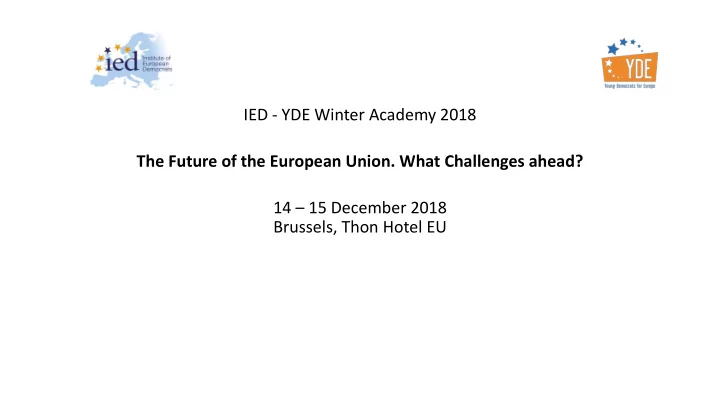

IED - YDE Winter Academy 2018 The Future of the European Union. What Challenges ahead? 14 – 15 December 2018 Brussels, Thon Hotel EU
By Mihai SEBE , PhD Member of the Scientific Committee IED E-mail: mihai.sebe@gmail.com • The views and opinions expressed in this presentation are those of the author alone and do not necessarily reflect the official policy or position of any organization he is connected to.
The political power of Social Media. How to to enhance the European ele lectoral campaig ign?
A A mult lti-dim imensio ional l approach to to disi isinformatio ion. Rep eport of f th the in independent Hig igh le level Group on fake news and and onli line dis isin informatio ion – March 2018, European Commission • Shared understanding of disinformation as a phenomenon that goes well beyond the term ≪ fake news ≫ . • Disinformation as defined in this Report includes all forms of false, inaccurate, or misleading information designed, presented and promoted to intentionally cause public harm or for profit. • It does not cover issues arising from the creation and dissemination online of illegal content (notably defamation, hate speech, incitement to violence), which are subject to regulatory remedies under EU or national laws. Nor does it cover other forms of deliberate but not misleading distortions of facts such a satire and parody.
• Problems of disinformation are deeply intertwined with the development of digital media. • They are driven by actors — state or non-state political actors, for- profit actors, media, citizens, individually or in groups — and by manipulative uses of communication infrastructures that have been harnessed to produce, circulate and amplify disinformation on a larger scale than previously, often in new ways that are still poorly mapped and understood.
Freedom on the Net (2018, Freedom House) The Rise of Digital Authoritarianism • Governments around the world are tightening control over citizens’ data and using claims of “fake news” to suppress dissent, eroding trust in the internet as well as the foundations of democracy. • Of the 65 countries assessed, 26 have been on an overall decline since June 2017, compared with 19 that registered net improvements. The biggest score declines took place in Egypt and Sri Lanka, followed by Cambodia, Kenya, Nigeria, the Philippines, and Venezuela. • In almost half of the countries where internet freedom declined, the reductions were related to elections. Twelve countries suffered from a rise in disinformation, censorship, technical attacks, or arrests of government critics in the lead-up to elections.
• 8 Consecutive years of global internet freedom declines • 36 Countries with representatives who attended Chinese trainings and seminars on new media or information management • 17 Governments approved or proposed laws restricting online media in the name of fighting “fake news” and online manipulation • 18 Countries increased surveillance, often eschewing independent oversight and weakening encryption to gain unfettered access to data
Recommendations for Policymakers • Ensure that all internet-related laws and practices adhere to international human rights law and standards. • Enact strong data protection laws to provide greater transparency and control over personal data. • Include human rights safeguards in national strategies on artificial intelligence (AI). • Fund rapid response capacity to counter attacks on internet freedom. • Impose sanctions — such as freezing of assets — on foreign tech companies involved in human rights abuses. • In the United States, reintroduce and pass the Global Online Freedom Act (GOFA).
How Social Media Has Changed Politics I . D i r e c t C o n t a c t W i t h V o t e r s I I . A d v e r t i s i n g W i t h o u t P a y i n g F o r A d v e r t i s i n g I I I . H o w C a m p a i g n s G o V i r a l I V . Ta i l o r i n g t h e M e s s a g e t o t h e A u d i e n c e V . F u n d r a i s i n g V I . C o n t r o v e r s y V I I . F e e d b a c k V I I I . W e i g h i n g P u b l i c O p i n i o n I X . I t ' s H i p X . T h e P o w e r o f M a n y
• Further reading • Online platforms, the digital single market and disinformation • http://www.europarl.europa.eu/legislative-train/theme-connected-digital-single- market/file-online-platforms-disinformation • Freedom on the Net 2018 • https://freedomhouse.org/report/freedom-net/freedom-net-2018/map • How Social Media Has Changed Politics • https://www.thoughtco.com/how-social-media-has-changed-politics-3367534
Recommend
More recommend